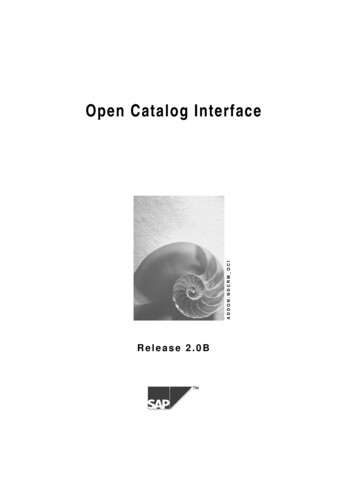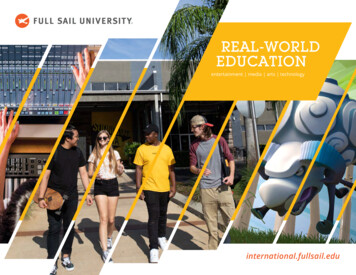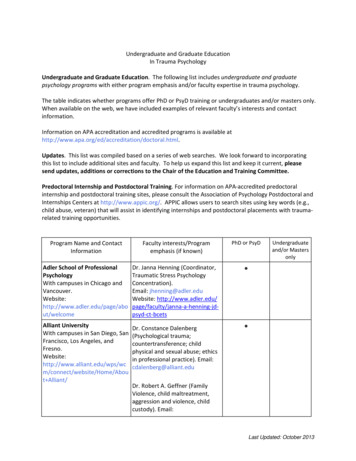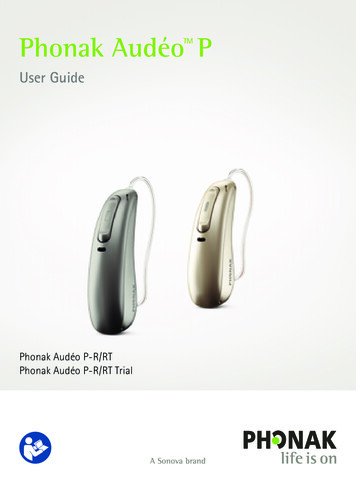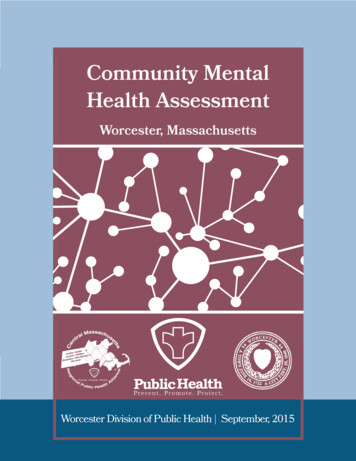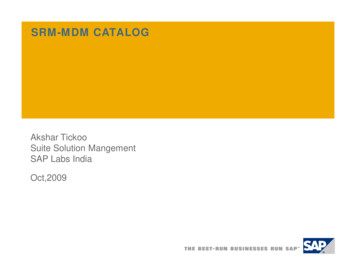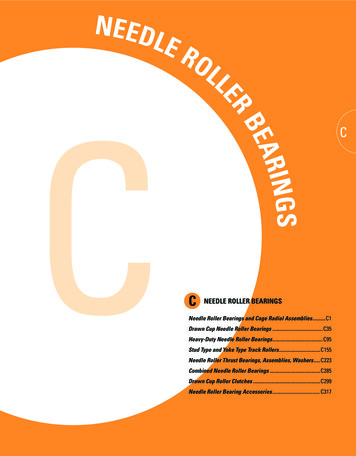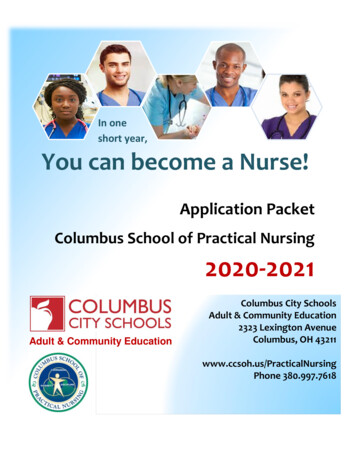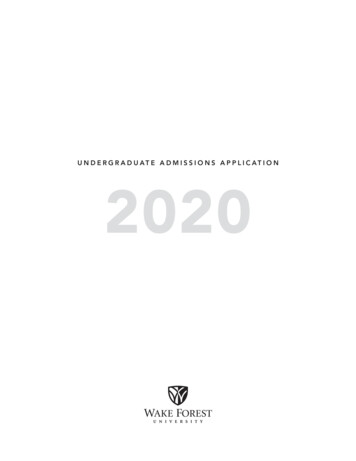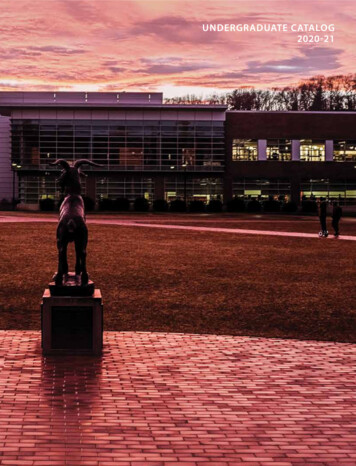
Transcription
UNDERGRADUATE CATALOG2020-21
Return to Table of ContentsCONTENTSThe Mission of WPI. . . . . . . . . . . . . . . . . . . . . . . . . . . . . . . . . . .The Goal of WPI. . . . . . . . . . . . . . . . . . . . . . . . . . . . . . . . . . . . . .A Statement of Values for Undergraduate Education at WPI . . . .WPI Undergraduate Learning Outcomes. . . . . . . . . . . . . . . . . . .WPI’s Commitment to Pluralism . . . . . . . . . . . . . . . . . . . . . . . . .The Two Towers Tradition: . . . . . . . . . . . . . . . . . . . . . . . . . . . . . .The Second Century. . . . . . . . . . . . . . . . . . . . . . . . . . . . . . . . . . .The WPI Plan. . . . . . . . . . . . . . . . . . . . . . . . . . . . . . . . . . . . . . . .33344555SECTION 1THE WPI PLAN. . . . . . . . . . . . . . . . . . . . . . . . . . . . . . . 6WPI Degree Requirements. . . . . . . . . . . . . . . . . . . . . . . . . . . . . . 7Major Areas of Study. . . . . . . . . . . . . . . . . . . . . . . . . . . . . . . . . . . 8Professionally Accredited Programs. . . . . . . . . . . . . . . . . . . . . . . . 9Academic Advising . . . . . . . . . . . . . . . . . . . . . . . . . . . . . . . . . . . 10Degree Options. . . . . . . . . . . . . . . . . . . . . . . . . . . . . . . . . . . . . . 11Concentrations . . . . . . . . . . . . . . . . . . . . . . . . . . . . . . . . . . . . . . 11Minors . . . . . . . . . . . . . . . . . . . . . . . . . . . . . . . . . . . . . . . . . . . . 11Double Majors . . . . . . . . . . . . . . . . . . . . . . . . . . . . . . . . . . . . . . 12Projects and Research. . . . . . . . . . . . . . . . . . . . . . . . . . . . . . . . . . 14The Major Qualifying Project. . . . . . . . . . . . . . . . . . . . . . . . . . . 17MQP Learning Outcomes. . . . . . . . . . . . . . . . . . . . . . . . . . . . . . 17MQP Project Centers . . . . . . . . . . . . . . . . . . . . . . . . . . . . . . . . . 17The Interactive Qualifying Project. . . . . . . . . . . . . . . . . . . . . . . . 18Global Projects Program . . . . . . . . . . . . . . . . . . . . . . . . . . . . . . . 19Off-Campus Programs . . . . . . . . . . . . . . . . . . . . . . . . . . . . . . . . 19Individually Sponsored Residential Projects (ISRPs). . . . . . . . . . 21Individually Sponsored On-Campus IQP Programs. . . . . . . . . . 21Humanities and Arts Requirement. . . . . . . . . . . . . . . . . . . . . . . 22The Social Science Requirement. . . . . . . . . . . . . . . . . . . . . . . . . 27SECTION 2DEPARTMENT AND PROGRAM DESCRIPTIONS. . . . . . 28Department and Program Descriptions. . . . . . . . . . . . . . . . . . . . 29Aerospace Engineering. . . . . . . . . . . . . . . . . . . . . . . . . . . . . . . . . 29Minor in Aerospace Engineering. . . . . . . . . . . . . . . . . . . . . . . 32Air Force Aerospace Studies. . . . . . . . . . . . . . . . . . . . . . . . . . . . . 32Architectural Engineering. . . . . . . . . . . . . . . . . . . . . . . . . . . . . . 33Minor in Architectural Engineering (AREN) . . . . . . . . . . . . . 34Bioinformatics and Computational Biology . . . . . . . . . . . . . . . . 36Minor in Bioinformatics and Computational Biology (BCB). 37Biology and Biotechnology. . . . . . . . . . . . . . . . . . . . . . . . . . . . . 37Minor in Biology. . . . . . . . . . . . . . . . . . . . . . . . . . . . . . . . . . . 38Biomedical Engineering. . . . . . . . . . . . . . . . . . . . . . . . . . . . . . . . 39Business, Robert A. Foisie School of . . . . . . . . . . . . . . . . . . . . . . 44Business (BU) . . . . . . . . . . . . . . . . . . . . . . . . . . . . . . . . . . . . . 44Management Engineering (MGE) . . . . . . . . . . . . . . . . . . . . . 47Management Information Systems (MIS) . . . . . . . . . . . . . . . 47Industrial Engineering. . . . . . . . . . . . . . . . . . . . . . . . . . . . . . . 48Minor in Business . . . . . . . . . . . . . . . . . . . . . . . . . . . . . . . . . . 50Minor in Entrepreneurship. . . . . . . . . . . . . . . . . . . . . . . . . . . 50Minor in Industrial Engineering. . . . . . . . . . . . . . . . . . . . . . . 50Minor in Management Information Systems. . . . . . . . . . . . . . 51Minor in Social Entrepreneurship. . . . . . . . . . . . . . . . . . . . . . 51Chemical Engineering. . . . . . . . . . . . . . . . . . . . . . . . . . . . . . . . . 52Chemistry and Biochemistry. . . . . . . . . . . . . . . . . . . . . . . . . . . . 541Minor in Biochemistry . . . . . . . . . . . . . . . . . . . . . . . . . . . . . . 56Minor in Chemistry. . . . . . . . . . . . . . . . . . . . . . . . . . . . . . . . . 56Civil and Environmental Engineering. . . . . . . . . . . . . . . . . . . . . 57Computer Science. . . . . . . . . . . . . . . . . . . . . . . . . . . . . . . . . . . . 60Minor in Computer Science . . . . . . . . . . . . . . . . . . . . . . . . . . 63Data Science . . . . . . . . . . . . . . . . . . . . . . . . . . . . . . . . . . . . . . . . 65Minor in Data Science . . . . . . . . . . . . . . . . . . . . . . . . . . . . . . 66Electrical and Computer Engineering. . . . . . . . . . . . . . . . . . . . . 70Minor in Electrical and Computer Engineering . . . . . . . . . . . 73Engineering Science Courses. . . . . . . . . . . . . . . . . . . . . . . . . . . . 73Environmental Engineering. . . . . . . . . . . . . . . . . . . . . . . . . . . . . 74Fire Protection Engineering. . . . . . . . . . . . . . . . . . . . . . . . . . . . . 76Humanities and Arts. . . . . . . . . . . . . . . . . . . . . . . . . . . . . . . . . . 76Professional Writing . . . . . . . . . . . . . . . . . . . . . . . . . . . . . . . . 79Humanities and Arts Minors. . . . . . . . . . . . . . . . . . . . . . . . . . 80American Studies. . . . . . . . . . . . . . . . . . . . . . . . . . . . . . . . . . . 80Chinese Studies. . . . . . . . . . . . . . . . . . . . . . . . . . . . . . . . . . . . 81Drama/Theatre. . . . . . . . . . . . . . . . . . . . . . . . . . . . . . . . . . . . 82English. . . . . . . . . . . . . . . . . . . . . . . . . . . . . . . . . . . . . . . . . . . 82Language (German or Spanish). . . . . . . . . . . . . . . . . . . . . . . . 82History. . . . . . . . . . . . . . . . . . . . . . . . . . . . . . . . . . . . . . . . . . . 83Media Arts. . . . . . . . . . . . . . . . . . . . . . . . . . . . . . . . . . . . . . . . 83Music. . . . . . . . . . . . . . . . . . . . . . . . . . . . . . . . . . . . . . . . . . . . 83Philosophy and Religion. . . . . . . . . . . . . . . . . . . . . . . . . . . . . 84Writing and Rhetoric. . . . . . . . . . . . . . . . . . . . . . . . . . . . . . . . 84Interactive Media & Game Development. . . . . . . . . . . . . . . . . . 84Interactive Media & Game Development (Bachelor of Arts) . 85Interactive Media & Game Development Technology(Bachelor of Science). . . . . . . . . . . . . . . . . . . . . . . . . . . . . . . . 86Minor in Interactive Media &Game Development. . . . . . . . . . . . . . . . . . . . . . . . . . . . . . . . . 87Interdisciplinary and Global Studies. . . . . . . . . . . . . . . . . . . . . . 87Interdisciplinary Minors . . . . . . . . . . . . . . . . . . . . . . . . . . . . . . . 88Minor in Global Public Health. . . . . . . . . . . . . . . . . . . . . . . . 88Minor in Nanoscience. . . . . . . . . . . . . . . . . . . . . . . . . . . . . . . 89Minor in Sustainability Engineering . . . . . . . . . . . . . . . . . . . . 89International Development, Environment, and Sustainability(IDEaS) (Bachelor of Arts Degree) . . . . . . . . . . . . . . . . . . . . . 90Major in Environmental and Sustainability Studies. . . . . . . . 91Minor in Environmental and Sustainability Studies . . . . . . . . 91Minor in Science and Engineering for Development (DEV). . 92International and Global Studies. . . . . . . . . . . . . . . . . . . . . . . . . 92Minor in International and Global Studies . . . . . . . . . . . . . . . 92Liberal Arts and Engineering (Bachelor of Arts Degree) . . . . . . . 95Mathematical Sciences. . . . . . . . . . . . . . . . . . . . . . . . . . . . . . . . . 97Minor in Statistics. . . . . . . . . . . . . . . . . . . . . . . . . . . . . . . . . 101Minor in Mathematics. . . . . . . . . . . . . . . . . . . . . . . . . . . . . . 102Mechanical Engineering . . . . . . . . . . . . . . . . . . . . . . . . . . . . . . 102Minor in Mechanical Engineering. . . . . . . . . . . . . . . . . . . . . 106Minor in Manufacturing Engineering. . . . . . . . . . . . . . . . . . 106Materials Engineering. . . . . . . . . . . . . . . . . . . . . . . . . . . . . . . . 107Minor in Materials. . . . . . . . . . . . . . . . . . . . . . . . . . . . . . . . . 107Military Science. . . . . . . . . . . . . . . . . . . . . . . . . . . . . . . . . . . . . 108Physical Education, Recreation, and Athletics. . . . . . . . . . . . . . 109Physics. . . . . . . . . . . . . . . . . . . . . . . . . . . . . . . . . . . . . . . . . . . . 110Minor in Physics. . . . . . . . . . . . . . . . . . . . . . . . . . . . . . . . . . 113Minor in Astrophysics. . . . . . . . . . . . . . . . . . . . . . . . . . . . . . 114
2ContentsPre-Professional Programs. . . . . . . . . . . . . . . . . . . . . . . . . . . 114Five-Year Dual Bachelor/M.S. in Management (MSMG). . . 114Pre-Health Programs. . . . . . . . . . . . . . . . . . . . . . . . . . . . . . . 115Pre-Law Programs. . . . . . . . . . . . . . . . . . . . . . . . . . . . . . . . . 115Teacher Preparation Program. . . . . . . . . . . . . . . . . . . . . . . . . 115Robotics Engineering . . . . . . . . . . . . . . . . . . . . . . . . . . . . . . . . 116Minor in Robotics Engineering. . . . . . . . . . . . . . . . . . . . . . . 117Social Science and Policy Studies. . . . . . . . . . . . . . . . . . . . . . . . 117Economic Science Program. . . . . . . . . . . . . . . . . . . . . . . . . . 118Psychological Science Program. . . . . . . . . . . . . . . . . . . . . . . . 119Society, Technology, and Policy Program. . . . . . . . . . . . . . . . 120Minor in Law and Technology. . . . . . . . . . . . . . . . . . . . . . . . 121Minors in Social Science . . . . . . . . . . . . . . . . . . . . . . . . . . . . 121SECTION 3COURSE DESCRIPTIONS. . . . . . . . . . . . . . . . . . . . . . 123Courses Qualifying for Engineering Distribution Areas . . . . . . 124Course Descriptions . . . . . . . . . . . . . . . . . . . . . . . . . . . . . . . . . 124Aerospace Engineering . . . . . . . . . . . . . . . . . . . . . . . . . . . . . . . 125Air Force Aerospace Studies. . . . . . . . . . . . . . . . . . . . . . . . . . . . 126Architectural Engineering. . . . . . . . . . . . . . . . . . . . . . . . . . . . . 128Basic Sciences. . . . . . . . . . . . . . . . . . . . . . . . . . . . . . . . . . . . . . . 129Bioinformatics and Computational Biology . . . . . . . . . . . . . . . 129Biology and Biotechnology. . . . . . . . . . . . . . . . . . . . . . . . . . . . 130Biomedical Engineering. . . . . . . . . . . . . . . . . . . . . . . . . . . . . . . 135Business, Robert A. Foisie School of . . . . . . . . . . . . . . . . . . . . . 138Chemical Engineering. . . . . . . . . . . . . . . . . . . . . . . . . . . . . . . . 142Chemistry and Biochemistry. . . . . . . . . . . . . . . . . . . . . . . . . . . 144Civil and Environmental Engineering. . . . . . . . . . . . . . . . . . . . 148Computer Science. . . . . . . . . . . . . . . . . . . . . . . . . . . . . . . . . . . 150Data Science . . . . . . . . . . . . . . . . . . . . . . . . . . . . . . . . . . . . . . . 154Electrical and Computer Engineering. . . . . . . . . . . . . . . . . . . . 155Engineering Science Interdisciplinary. . . . . . . . . . . . . . . . . . . . 158Fire Protection Engineering. . . . . . . . . . . . . . . . . . . . . . . . . . . . 160Humanities and Arts. . . . . . . . . . . . . . . . . . . . . . . . . . . . . . . . . 161Independent Study . . . . . . . . . . . . . . . . . . . . . . . . . . . . . . . . . . 179Interactive Media & Game Development. . . . . . . . . . . . . . . . . 179Interdisciplinary. . . . . . . . . . . . . . . . . . . . . . . . . . . . . . . . . . . . . 182Mathematical Sciences. . . . . . . . . . . . . . . . . . . . . . . . . . . . . . . . 184Mechanical Engineering . . . . . . . . . . . . . . . . . . . . . . . . . . . . . . 189Military Science. . . . . . . . . . . . . . . . . . . . . . . . . . . . . . . . . . . . . 192Physical Education . . . . . . . . . . . . . . . . . . . . . . . . . . . . . . . . . . 194Physics. . . . . . . . . . . . . . . . . . . . . . . . . . . . . . . . . . . . . . . . . . . . 195Robotics Engineering . . . . . . . . . . . . . . . . . . . . . . . . . . . . . . . . 197Social Science and Policy Studies. . . . . . . . . . . . . . . . . . . . . . . . 198SECTION 4UNIVERSITY POLICIES AND PROCEDURES. . . . . . . . . 207University Policies and Procedures. . . . . . . . . . . . . . . . . . . . . . .Grades. . . . . . . . . . . . . . . . . . . . . . . . . . . . . . . . . . . . . . . . . . . .Grade Appeal and Grade Change Policy. . . . . . . . . . . . . . . . . .Transfer Credit . . . . . . . . . . . . . . . . . . . . . . . . . . . . . . . . . . . . .Graduation with Honors. . . . . . . . . . . . . . . . . . . . . . . . . . . . . .Commencement. . . . . . . . . . . . . . . . . . . . . . . . . . . . . . . . . . . .Early Completion . . . . . . . . . . . . . . . . . . . . . . . . . . . . . . . . . . .Designation of Major Area of Study . . . . . . . . . . . . . . . . . . . . .Double Major. . . . . . . . . . . . . . . . . . . . . . . . . . . . . . . . . . . . . .208208209211211212212212212Designation of Class Year. . . . . . . . . . . . . . . . . . . . . . . . . . . . . .Academic Honesty Policy . . . . . . . . . . . . . . . . . . . . . . . . . . . . .Guidelines for the Determination of Satisfactory AcademicProgress, Academic Warning, Academic Probationand Academic Suspension. . . . . . . . . . . . . . . . . . . . . . . . . . .Administrative Obligations and Holds . . . . . . . . . . . . . . . . . . .Directory Information and Release of Information. . . . . . . . . .Office of the Registrar. . . . . . . . . . . . . . . . . . . . . . . . . . . . . . . .Part-Time Degree Students. . . . . . . . . . . . . . . . . . . . . . . . . . . .Non-Degree Students . . . . . . . . . . . . . . . . . . . . . . . . . . . . . . . .212212214215215216219219SECTION 5RESOURCES AND SPECIAL PROGRAMS. . . . . . . . . . . 221Resources and Special Programs. . . . . . . . . . . . . . . . . . . . . . . . . 222The Gateway Park. . . . . . . . . . . . . . . . . . . . . . . . . . . . . . . . . . . 222Special Programs for First Year Students . . . . . . . . . . . . . . . . . . 222Graduate Courses . . . . . . . . . . . . . . . . . . . . . . . . . . . . . . . . . . . 222Combined Bachelor/Master’s Program . . . . . . . . . . . . . . . . . . . 222Information Technology Services. . . . . . . . . . . . . . . . . . . . . . . . 223Music and Theatre Facilities . . . . . . . . . . . . . . . . . . . . . . . . . . . 224George C. Gordon Library . . . . . . . . . . . . . . . . . . . . . . . . . . . . 225Student Services. . . . . . . . . . . . . . . . . . . . . . . . . . . . . . . . . . . . . 226Student Exchanges. . . . . . . . . . . . . . . . . . . . . . . . . . . . . . . . . . . 227Language Requirements . . . . . . . . . . . . . . . . . . . . . . . . . . . . . . 227HECCMA Course Cross-Registration . . . . . . . . . . . . . . . . . . . 228Cooperative Education. . . . . . . . . . . . . . . . . . . . . . . . . . . . . . . 228Summer Session (Term E). . . . . . . . . . . . . . . . . . . . . . . . . . . . . 230Awards and Prizes . . . . . . . . . . . . . . . . . . . . . . . . . . . . . . . . . . . 231Societies, Registration and Licensing. . . . . . . . . . . . . . . . . . . . . 234SECTION 6CAREER DEVELOPMENT AND GRADUATE SCHOOL. . . 235Career Development and Graduate School Advising. . . . . . . . . 236Career Development Center. . . . . . . . . . . . . . . . . . . . . . . . . . . 236Graduate Study at WPI. . . . . . . . . . . . . . . . . . . . . . . . . . . . . . . 237SECTION 7ADMISSION, EXPENSES, FINANCIAL AIDAND HOUSING. . . . . . . . . . . . . . . . . . . . . . . . . . . . . 241Admission to WPI. . . . . . . . . . . . . . . . . . . . . . . . . . . . . . . . . . .Expenses . . . . . . . . . . . . . . . . . . . . . . . . . . . . . . . . . . . . . . . . . .Financial Aid. . . . . . . . . . . . . . . . . . . . . . . . . . . . . . . . . . . . . . .Housing. . . . . . . . . . . . . . . . . . . . . . . . . . . . . . . . . . . . . . . . . . .242245247251SECTION 8TRUSTEES ADMINISTRATION AND FACULTY . . . . . . . 253Trustees, Administration and Faculty. . . . . . . . . . . . . . . . . . . . . 254Trustees. . . . . . . . . . . . . . . . . . . . . . . . . . . . . . . . . . . . . . . . . . . 254Administration . . . . . . . . . . . . . . . . . . . . . . . . . . . . . . . . . . . . . 256Faculty. . . . . . . . . . . . . . . . . . . . . . . . . . . . . . . . . . . . . . . . . . . . 257Index. . . . . . . . . . . . . . . . . . . . . . . . . . . . . . . . . . . . . . . . . . . . . 280Policies & Practices . . . . . . . . . . . . . . . . . . . . . . . . . . . . . . . . . . 284Currency of Information. . . . . . . . . . . . . . . . . . . . . . . . . . . . . . 284Accreditation. . . . . . . . . . . . . . . . . . . . . . . . . . . . . . . . . . . . . . . 285Directions . . . . . . . . . . . . . . . . . . . . . . . . . . . . . . . . . . . . . . . . . 285Campus Map. . . . . . . . . . . . . . . . . . . . . . . . . . . . . . . . . . . . . . . 286
THE MISSION OF WPIWPI educates talented men and women in engineering, science,management, and humanities in preparation for careers ofprofessional practice, civic contribution, and leadership,facilitated by active lifelong learning. This educational processis true to the founders’ directive to create, to discover, and toconvey knowledge at the frontiers of academic inquiry for the3betterment of society. Knowledge is created and discovered inthe scholarly a ctivities of faculty and students ranging acrosseducational methodology, professional practice, and basicresearch. Knowledge is conveyed through scholarly publicationand instruction.Adopted by the Board of Trustees, May 22, 1987THE GOAL OF WPIWPI was founded in 1865 to create and convey the latestscience and engineering knowledge in ways that would be mostuseful to the society from which its students came. Since thattime, the disciplines of human inquiry have expanded extraordinarily, as have WPI’s constituencies. The WPI curriculum,accordingly, has been reshaped numerous times, but it hasremained true to its original mission of fusing academic inquirywith social needs, of blending abstraction with immediacy, oflinking new knowledge to applications.The goals of the undergraduate program are to lead studentsto develop an excellent grasp of fundamental concepts in theirprincipal areas of study; to lay a foundation for life-long renewalof knowledge; to gain a mature understanding of themselves;and, most importantly, to form a deep appreciation of theinterrelationships among basic knowledge, technologicaladvance, and human need. These principles are today manifestin the WPI Plan, a unique, project-oriented program whichemphasizes intensive learning experiences and direct applicationof knowledge. WPI remains committed to continued educational improvement and innovation.The goals of WPI’s programs of graduate instruction andresearch are to create and convey knowledge at the frontiers ofacademic inquiry. These endeavors are founded on the principlethat vigorously pursued and rigorously assessed scholarship isthe lifeblood of the institution. High quality graduate instruction conveys the arts of scholarship to new generations, and itassists working professionals in maintaining currency in a worldwhere knowledge becomes obsolete with ever-increasing rapidity.A WPI education encompasses continuous striving forexcellence coupled with an examination of the contexts oflearning so that knowledge is won not only for its own sake butalso for the sake of the human community of which the peopleof WPI are part.Endorsed by the WPI Faculty on March 5, 1987, and by the Boardof Trustees on October 16, 1987.A STATEMENT OF VALUES FORUNDERGRADUATE EDUCATION AT WPI1. WPI’s programs shall emphasize fundamental concepts,knowledge, and skill, and ensure that students are able toapply them within the context of their major disciplines.2. WPI’s programs shall emphasize the development of studentsas effective thinkers and communicators, able to use evidenceto present their ideas with logic, clarity, and persuasion.3. Programmatic breadth in general, and balance betweentechnical and humanistic components in particular, are thehallmarks of a WPI undergraduate education. In addition toeducating students in their major discipline, WPI’s programsshall provide students with a broad preparation for fulfillinglives as responsible professionals and informed citizens.4. Grounded in project and course experiences, a WPI education shall provide a firm foundation for life-long learning in avariety of fields. WPI programs shall emphasize inquirybased learning and open-ended problem solving. Studentsshall bear a considerable responsibility for learning outside ofthe classroom.5. WPI’s programs shall be sufficiently flexible so as to allowstudents significant choice in and responsibility for planningtheir courses of study. Faculty, via the central teaching tasksof project and academic advising, shall ensure that studentlearning experiences encourage critical reflection, decisionmaking, and personal growth.6. WPI’s programs shall emphasize the scientific, technical,societal, and humanistic contexts in which knowledge isapplied and constructed. Education activities shall challengestudents to make connections between disciplines, toconsider multiple viewpoints, and to appreciate the consequences of their actions. The curriculum shall prominentlyfeature integrative and interdisciplinary activities.7. WPI’s learning environment and educational activities shallbalance personal responsibility and individual accountabilitywith cooperation, collaboration and mutual respect. Members of the community shall be encouraged to value academicintegrity, and to become conscious of the value that suchintegrity confers to themselves and to the community.8. WPI shall be committed to assessment and improvement ofstudent learning.
4WPI UNDERGRADUATE LEARNING OUTCOMESGraduates of WPI will:1. have a base of knowledge in mathematics, science, andhumanistic studies.2. have mastered fundamental concepts and methods in theirprincipal areas of study.3. understand and employ current technological tools.4. be effective in oral, written and visual communication.5. function effectively both individually and on teams.6. be able to identify, analyze, and solve problems c reativelythrough sustained critical investigation.7. be able to make connections between disciplines and tointegrate information from multiple sources.8. demonstrate global and intercultural competency bydeveloping the capacity to identify, explain, and criticallyanalyze the forces (such as cultural, historical, political,economic) that shape the self and others as they engage withlocal and global communities.9. be aware of personal, societal, and professional e thicalstandards.10. have the skills, diligence, and commitment to excellenceneeded to engage in lifelong learning.Approved by the WPI Faculty on May 3, 2019.WPI’S COMMITMENT TO PLURALISMPluralism, as a social condition, means that several distinctethnic, religious, and racial communities live side by side, haveequitable access to resources, are willing to affirm each other’sdignity, are ready to benefit from each other’s experiences, andare quick to acknowledge each other’s contributions to thecommon welfare. Recognizing the importance of pluralism tocreativity, innovation, and excellence, WPI is dedicated tocreating an atmosphere that encourages diversity in all aspects ofcampus life–from academics, to residence hall living, to socialinteractions among students, faculty, and staff. The Instituterecognizes the special obligation of promoting a multiculturalcommunity based on mutual respect and tolerance. Thiscommitment is part of WPI’s institutional plan for encouragingpluralism and increasing diversity, a plan that proclaims theimportance of having students understand and appreciate othercultures, and prepares them fully to pursue rewarding careers inan increasingly global economy.Concepts endorsed by the WPI Faculty on April 21, 1994.
THE TWO TOWERS TRADITION:THE SECOND CENTURY5WPI, the nation’s third oldest private technological university,was established in 1865 by the New England industrialists JohnBoynton, Ichabod Washburn, and their associates. Boyntonand Washburn endowed the first two buildings on campus, asacademic classrooms and practical shops.
tion shall provide a firm foundation for life-long learning in a variety of fields . WPI programs shall emphasize inquiry-based learning and open-ended problem solving . Students shall bear a considerable responsibility for learning outside of the classroom . 5 . WPI's programs shall be sufficiently flexible so as to allow

